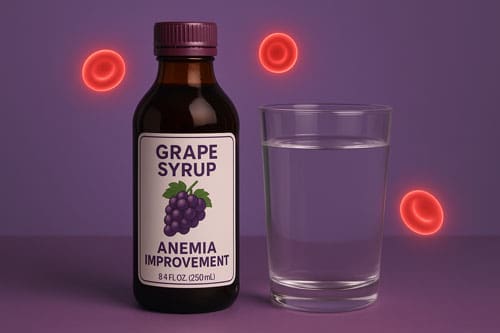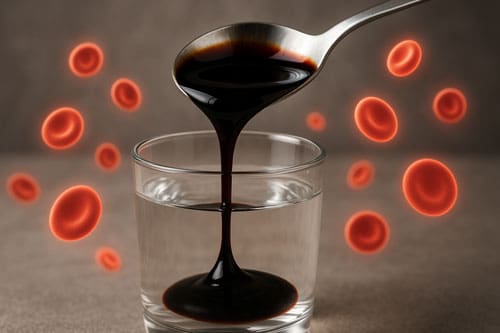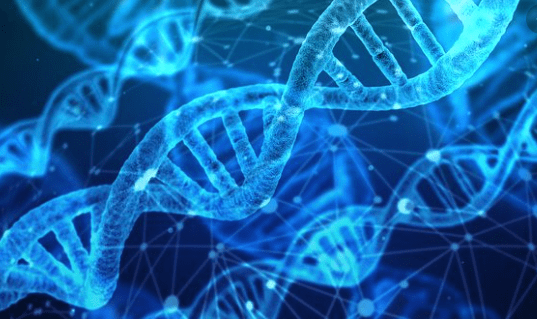Grape Syrup Improved Hemoglobin In Anemic Women
Overview

Iron deficiency is the most common nutritional disorder worldwide, with anemia particularly affecting women of childbearing age. Although current treatments, such as iron supplements, are effective, they often come with side effects. This study investigates the potential of grape syrup (GS), a functional food rich in iron, to influence markers of iron-deficient anemia in women.
In a randomized, double-blind trial involving 130 women, participants were divided into intervention and placebo groups. The intervention group received a daily 50 mg ferrous sulfate tablet along with 10 cc of grape syrup three times daily for four weeks. The placebo group received a 50 mg ferrous sulfate tablet with 10 cc of placebo syrup three times daily.
Before and after the treatment, various markers of iron deficiency, including red blood cell count (RBC), mean corpuscular volume (MCV), hemoglobin (Hb), hematocrit (Hct), ferritin, total iron binding capacity (TIBC), and serum iron, were measured. Results showed that the Hb and Hct levels were significantly higher in the grape syrup group compared to the placebo group (p < .05). Additionally, RBC and MCV values improved significantly in the grape syrup group (p < .05). However, no significant differences were found in other markers like serum iron, ferritin, and TIBC (p > .05).
These findings indicate that incorporating grape syrup with iron tablets may provide additional benefits in managing iron deficiency anemia compared to iron tablets alone.
Introduction
Anemia affects approximately one-third of the global population, with its prevalence increasing with age and disproportionately impacting women of childbearing age, pregnant women, and older adults (Cappellini et al., 2020). Heavy menstrual bleeding affects about 30% of women of childbearing age, heightening their risk of iron deficiency anemia (IDA) (Mansour et al., 2021). The World Health Organization identifies IDA as a significant public health issue with substantial economic costs (Newhall et al., 2020). In addition to its economic impact, IDA is associated with various health complications, such as recurrent infections, digestive problems, obesity, and gum disease (Cappellini et al., 2020). It may also cause gastrointestinal issues like constipation and bloating (Bloor et al., 2021) and an increase in pathological bacteria in the colon, potentially leading to inflammatory diseases and colon cancer (Tolkien et al., 2015). This highlights the urgent need for safe and effective alternative treatments for this widespread condition.
Recent attention has focused on the role of nutrition in managing IDA (Newhall et al., 2020; Zulfiqar et al., 2021). Traditional Persian Medicine (TPM) has long emphasized dietary interventions for the prevention and treatment of various health issues (Avicenna, 2005; Bahaeddin et al., 2023; Nimrouzi & Zare, 2014). TPM advocates for foods like meat, eggs, figs, grapes, and grape syrup as remedies for anemia (Avicenna, 2005; Fatali et al., 2020). Grape syrup, a sweet and dense product made by boiling and condensing grape juice, has been a traditional staple for centuries (Helvacioglu et al., 2018). Recently, it has gained popularity as a natural sweetener alternative to refined sugar (Levent et al., 2022; Mousavi Kalajahi, 2021). Grape syrup is nutritionally rich, containing high levels of glucose, fructose, organic acids, and essential minerals such as iron, copper, zinc, calcium, and magnesium (Helvacioglu et al., 2018; Tavakolipour et al., 2020). Its mineral content and easy digestibility enable it to meet up to 37% of daily iron needs (Aşcı & Baydar, 2021). Additionally, it has antioxidant, anti-mutagenic, anticancer, and anti-inflammatory properties (Pérez-Ortiz et al., 2019; Wang et al., 2011).
This study aims to evaluate the effects of grape syrup on hematological markers of IDA, such as hemoglobin, hematocrit, red blood cell count, mean corpuscular volume, ferritin, and serum iron, in women with the condition. It is hypothesized that grape syrup supplementation will significantly improve these key hematological markers in women suffering from IDA.
Method
This randomized clinical trial, conducted at Imam Khomeini Hospital in Urumia, Iran, from February 2020 to October 2022, investigated the efficacy of grape syrup in treating anemia among women aged 15–49 with hemoglobin levels between 10 and 12 g/dL, as confirmed by a hematologist. Exclusion criteria included chronic systemic diseases, abnormal bleeding, recent childbirth or surgery, thalassemia, tuberculosis, sickle cell disease, pregnancy, diabetes, allergies to grapes or iron pills, and significant adverse reactions or participant withdrawals. The study was approved by the Shahed University Institutional Review Board (IRB code: IR.SHAHED.REC.1398.108) and registered with the Iranian Registry of Clinical Trials (code: IRCT20200120046205N1).
Preparation of Treatments:
-Grape Syrup (GS): Made from white grapes and provided in 250-mL dark glass bottles. Participants received a 4-week supply (four bottles).
– Placebo: Crafted to mimic grape syrup in consistency and color using sodium saccharin, carboxymethylcellulose, and caramel. It was also stored in identical bottles.
– Iron Tablets: Each tablet contained 50 mg of ferrous sulfate, sourced from Darupakhsh Chemical Co., Iran.
Participants were randomly assigned (1:1) to either the intervention or placebo group using a computer-generated randomization table, with allocation concealed in opaque, serially numbered envelopes. Unique codes were assigned to each treatment or placebo, with labels indicating dosage instructions. Both researchers and participants were blinded to these codes.
For 4 weeks, the intervention group received 50 mg of ferrous sulfate and 10 cc of grape syrup diluted in lukewarm water three times daily before meals. The control group received the same dose of ferrous sulfate but with placebo syrup.
– Primary Outcome: Change in hemoglobin (Hb) concentration over the 4-week period.
– Secondary Outcomes: Changes in other hematological markers (Hct, MCV, RBC, serum iron, ferritin, TIBC), vital signs, adverse effects, dropout rates, and quality of life. Quality of life was assessed using the General Health Questionnaire-28 (GHQ-28), validated for the Iranian population. Adverse reactions were monitored using a specific questionnaire. Grape syrup was analyzed for heavy metals (iron, copper, zinc, lead, arsenic, tin) using flame atomic absorption spectrometry, with permissible limits based on Iranian National Standards Organization (INSO) guidelines.

A sample size of at least 40 participants per group was determined using a superiority analysis with a 5% significance level and 80% power. Data were analyzed using SPSS (version 26), with quantitative results reported as means ± standard deviations and qualitative data as frequencies and percentages. Between-group comparisons were conducted using independent t-tests for normally distributed data and Mann–Whitney U-tests for non-normally distributed data. Statistical significance was set at p < 0.05.
Result
Initially, 159 women with iron deficiency anemia (IDA) showed interest in the study. After screening for eligibility and availability, 130 were enrolled and randomly assigned to either the grape syrup (GS) group (n = 63) or the placebo group (n = 67). Throughout the study, 50 participants withdrew—23 from the GS group and 27 from the placebo group. Ultimately, 80 participants completed the study and were analyzed (40 in each group), with both groups having similar baseline characteristics.
Significant improvements in key hematological markers were observed after 4 weeks of intervention in both groups. Notably, the increase in red blood cell count (RBC) was significantly greater in the grape syrup group (0.29 ± 0.30) compared to the placebo group (0.11 ± 0.03) (p = .003). Similarly, the mean corpuscular volume (MCV) increase was higher in the grape syrup group (4.13 ± 0.67) compared to the placebo group (1.47 ± 0.48) (p = .002). This indicates that the grape syrup intervention was more effective in improving RBC and MCV levels than the placebo.
Hemoglobin and hematocrit levels also increased significantly more in the GS group compared to the placebo (p = .0001), suggesting a more substantial improvement in anemia markers. However, no significant differences were found between the groups for iron, ferritin, or total iron-binding capacity (TIBC) after the intervention.
Quality of life, as assessed by the GHQ-28, did not show significant differences between the GS and placebo groups post-intervention. Nevertheless, the grape syrup group experienced a statistically significant improvement in GHQ-28 scores from baseline (p = .001), indicating a positive impact on quality of life. No significant changes were noted in vital signs or liver function tests between the groups (p > .1). Analysis of heavy metals in the grape syrup confirmed that levels were within acceptable ranges as per the Iranian Standard Organization.
Both groups reported mild gastrointestinal side effects, such as nausea, abdominal pain, and stomach discomfort, with a slightly higher incidence in the placebo group (15 cases) compared to the grape syrup group (10 cases). No severe side effects were reported in either group.
Conclusion
The study observed significant improvements in key blood parameters related to anemia for the grape syrup (GS) group compared to the placebo group (p < .003). The grape syrup group showed notable increases in hemoglobin, hematocrit, red blood cell count, and mean corpuscular volume (MCV). Additionally, quality of life, assessed via the GHQ-28 score, improved significantly in the grape syrup group (p = .001). However, serum iron, ferritin, and total iron-binding capacity (TIBC) did not show significant differences between the groups, indicating that these markers might require longer observation periods (3–6 months) to reflect changes from oral iron supplementation, as suggested by previous research.
Grape syrup, a popular food product particularly common at breakfast in many Middle Eastern countries and used in various desserts and cookies, is recognized for its high carbohydrate content, which provides energy. Its functional food status is attributed to its mineral compounds, phenolic content, and organic acids. The iron in grape syrup is noted for its high digestibility and absorption. A study on 56 children aged 6–36 months found that grape syrup could be an effective iron source for preventing iron deficiency anemia (IDA).
Grapes are rich in antioxidants, antimicrobials, and anticancer compounds, and grape juice is known for its high levels of glucose, fructose, sucrose, vitamins A, C, B1, B2, minerals, and antioxidant agents. This makes grape products valuable dietary components, particularly for children, women, and athletes. The study focused on the macro- and microelement content of grape syrup (molasses) and found high concentrations of essential minerals like iron, zinc, calcium, potassium, and copper. Levels of toxic elements were minimal, meeting safety standards set by the Iranian Standard Organization, thereby supporting the safety and potential health benefits of grape syrup.
Heavy metals are categorized into essential and non-essential types. While non-essential metals like mercury, lead, chromium, cadmium, and arsenic are hazardous, essential metals like copper, iron, manganese, cobalt, and zinc are crucial for various physiological functions. The study’s findings suggest that the high concentration of essential minerals, especially iron, and the good absorption of iron in grape syrup support its potential therapeutic effects on IDA.
The study is notable for being the first clinical trial to investigate grape syrup—a readily available, natural iron-rich product from Uremia and Iran—as a treatment for IDA in women. However, it is limited by a small sample size, a short intervention period, and brief follow-up duration.
Grape syrup significantly improved hemoglobin, hematocrit, red blood cell count, and MCV compared to placebo, indicating its potential as a supplementary therapy for IDA. Future research with larger sample sizes and extended follow-up periods is recommended to explore the long-term efficacy and safety of grape syrup for IDA management.

